- Home
- Franklin W. Dixon
Past and Present Danger Page 2
Past and Present Danger Read online
Page 2
The setting sun cast a rich orange and red glow over everything—cars, trees, buildings, even people. Despite that, Joe could tell that the man Mr. Silvers was walking up to was pale as a ghost.
He was short and thin, with a flat nose and beady eyes that sparkled like those of a rat. Joe moved closer and ducked behind an old station wagon to watch as the man gave Silvers a leering smile. Joe could not see Silvers’s face, but judging from his body language, Mr. Silvers was anxious, eager, or angry.
The little man made a gesture by rubbing his thumb and first two fingers together. Without hesitation, Clayton Silvers reached inside his jacket, withdrew a plain white envelope, and handed it to his companion.
The rat-eyed man grinned, and Joe couldn’t help feeling he was about to bite Silvers’s throat. The man handed Clayton Silvers a folded sheet of paper and then tore open the envelope. Joe watched as the reddish orange of the sunset washed over the crisp green bills in the ghostlike hand—hundred-dollar bills.
3
Tips and Tales
This man is not a travel agent, Joe told himself. So Clayton Silvers’s vacation story was just that, a story.
Silvers unfolded the sheet of paper the little man had given him and read it carefully. Then he tore it into pieces and dropped it into a Dumpster near them. The two men continued talking for another few minutes, and Joe could tell the little man was very excited about something. As he talked, his arms and hands flapped about like a marionette’s.
Just as Joe had decided to get closer to eavesdrop on their conversation, the two men split up and took separate exits out of the parking lot. Clayton Silvers headed back into the mall, the little man toward a side street.
Joe let Silvers walk back into the shopping center before he stepped out of his hiding place and ran to the exit the little man had taken. The path led through an adjoining parking lot behind a bank, but the man was nowhere in sight.
Thinking quickly, Joe ran back to the Dumpster. Glancing around to make sure no one was watching, Joe leaned in, holding his breath against the odor of various decaying items. Joe spotted the torn bits of the note lying on top of a plastic garbage bag. He gingerly removed them and slipped them into the pocket of his windbreaker.
Within minutes Joe was approaching the Hardys’ van with Frank and Aunt Gertrude sitting in the front seats.
“Where did you go?” Joe’s aunt asked impatiently.
“I thought I left something in the store,” Joe replied as he climbed into the passenger seat behind his aunt.
“Did you find it?” she asked.
“Yes,” Joe said slyly. “I got … it.”
“Good.” Aunt Gertrude gave Frank the signal to start the vehicle. “We may not have time to finish the errands, but I have to pick up a few extra things for lunch tomorrow.”
Joe leaned back in his seat and grinned. “That’s right,” he said. “Mr. Silvers will be there … ready to tell all, I hope.”
Frank chuckled as he pulled away. Aunt Gertrude studied a shopping list she had just written—a little too hard.
When the Hardys finally got home, the boys spent half an hour unloading the van and putting things away, while their aunt supervised and cooked.
Dinner consisted of a tender, juicy meat loaf ith baby red bliss potatoes and buttered asparagus. The vegetable was one of Aunt Gertrude’s favorites … just not everybody else’s. Several times Joe wished they had a dog he could slip food to under the table.
Since their mother, Laura, was away visiting a relative, and their father, Fenton, was having dinner ith a new client, the boys ate with their aunt, then went out to the backyard to talk. Joe was anxious to get Frank’s take on what he had seen.
“So he met with this short guy, slipped him some money, then took off?” Frank repeated after Joe had brought him up to date.
“That’s about the size of it,” Joe replied.
“And you think you know the guy Mr. Silvers met?”
Joe shrugged. “I think I’ve seen him around town, but I can’t be sure.” He fished the slips of torn paper out of his pocket and laid them down on the picnic table.
After a few minutes of moving the pieces around, the boys found they had only part of the message. An upper corner and two pieces from the center were missing.
Joe frowned. “I missed a few pieces.”
“We can read most of it,” Frank said. “Looks like … ‘target … worth millions … check out point man … three days left.’”
“So why’d Clayton tell us he was on vacation?” Joe asked.
“Probably he didn’t want to worry Aunt Gertrude,” Frank replied. “You know how she can be.”
“I thought I did,” Joe said, leaning back in his chair. “But after what she did today, and what Mr. Silvers hinted at … I’m not sure.”
“I’m curious about what he said about Dad,” Frank said. “That Dad didn’t like him much. I want to talk to Dad about that.”
“His new job is going to keep him pretty busy,” Joe replied. “He didn’t tell us who he’s working for. Maybe he won’t even be here when Clayton comes to lunch tomorrow.”
Frank gathered up the pieces of the torn note. “Well, maybe we’ll learn more tomorrow,” he said.
“Especially about Spitfire,” Joe said.
The boys laughed, then went back inside the house.
The next morning Frank and Joe weren’t too upset about being stuck at home. The sky was steel gray, and a relentless drizzle spattered the window-panes.
Frank tinkered around in the basement while Joe went back to bed.
It was eleven-thirty when Frank came up out of the basement to find his aunt rushing around the kitchen, preparing lunch. “I can’t remember—what time is Mr. Silvers arriving?” he asked.
“We had said one, but when he called, I told him twelve-thirty would be good,” Aunt Gertrude replied. She was placing slices of smoked turkey around a large oval platter. The edges of the meat were brown, with a slight sheen to them.
“Honey glazed?” Frank asked, licking his upper lip.
“Yes,” Gertrude Hardy replied. “There’s also ham, rye and pumpernickel breads, three types of cheese, pickles, and a German cole slaw.”
Frank lounged against the doorframe. “We haven’t had a lunch like this since you were working for the mayoral race. Who are you trying to impress now?”
“No one,” Aunt Gertrude protested.
“You and Mr. Silvers never dated, did you?”
“No,” Aunt Gertrude insisted. She stared at Frank, then smiled. “Clayton represents another time in my life … one I haven’t thought about for a long while.”
“What do you mean?” Frank asked. Before his aunt could answer, Fenton Hardy walked into the room. “When did you get back, Dad? You were gone when I woke up.”
“Just a few minutes ago,” Fenton Hardy replied. He was a well-built man, strong, good looking, with brown hair and eyes. He wore a crisp white shirt, print tie, and a pair of light gray slacks. “I have to go back right after lunch.”
“Can’t you tell us what you’re working on?” Frank asked.
“Not yet,” his father replied as he reached for one of the cherry tomatoes that Aunt Gertrude was stacking in a serving bowl.
His sister lightly smacked his hand. “They’re for lunch,” she scolded. “If you’d had a decent breakfast instead of just a cup of coffee—”
“Yes, ma’am,” Fenton teased. “You sound like Mother.”
“Obviously the women of this family received all the common sense,” Aunt Gertrude replied, without missing a beat.
Frank chuckled. “So, Dad, Mr. Silvers said you didn’t like him.”
Fenton Hardy raised an eyebrow. “That’s not exactly true.” Mr. Hardy took a container of orange juice from the refrigerator. “Even though Gertrude was older than I was, Dad expected me to look after her.”
“And you jumped at the job,” his sister replied. She turned to Frank. “Your father had detective
instincts even when he was fourteen. Always checking on me and—”
“Only when Mom and Dad didn’t know where you were,” Fenton interrupted. “In high school, Aunt Gertrude almost always came home late.”
“Aunt Gertrude?”
All eyes turned to Joe Hardy as he stumbled into the kitchen, sleepy-eyed, barefoot, and wearing a wrinkled T-shirt and cutoff shorts. “Tell me more.”
“I was involved in a lot of after-school programs,” Gertrude Hardy replied huffily.
“You mean like the French club and stuff?” Joe asked.
“No,” Fenton Hardy said. “More like human rights groups and community programs. My sister was even involved in a couple of mid-sixties protest rallies.”
Both boys stared at their aunt in disbelief.
“Why does that shock you?” she asked indignantly.
“Uh …” was all Joe could say.
Frank did not do much better. “It’s just that … well, uh …”
“I see.” Aunt Gertrude appeared a little hurt by their reactions. “Clayton will be here in a little bit. I suggest you both wash up. Then you can help me set the table.”
Gertrude Hardy began tearing leaves from a head of lettuce and rinsing them.
“Go on, boys,” their father instructed. “We can talk more later.”
By the time Clayton Silvers arrived, everything was ready. If there were any bad feelings between their father and Clayton Silvers, the boys could not detect them. Fenton Hardy had vigorously shaken Silvers’s hand when he arrived, and they had been laughing and talking easily for the past half-hour during lunch.
Aunt Gertrude joined in and even mentioned some of the cases Fenton and the boys had worked on.
“And that was how we broke that smuggling case,” Joe said, trying not to boast. “Dad got the big boss, and we caught the underlings.”
“I think I remember reading about that,” Mr. Silvers said. “Seems like you boys are following in your dad’s footsteps.”
“We want to,” Frank replied, and glanced at his father, who seemed to be lost to the world, studying Clayton’s face. Was something wrong? Frank wondered.
“Enough about us, Mr. Silvers,” Joe insisted. “Tell us about your job.”
For the first time since he arrived, Clayton Silvers appeared to be uncomfortable.
“You work for a major Washington newspaper, right?” Frank asked.
“I’m on vacation,” Clayton replied, then took a sip of his after-lunch coffee. “I’d rather not talk shop now.”
“We just wondered what paper,” Joe went on.
“I used to work for the Post,” Clayton replied. “Now I’m freelance. I cover whatever I want for whichever paper ill pay me.” Clayton took another sip.
“Perhaps Clayton will tell us about his adventures another time, boys,” Fenton Hardy cut in. “I know what it’s like to try to leave things behind … especially tough things.”
Frank noticed the look exchanged between the two men. What was going on? Was there a problem, or did their father know why Clayton had come to Bayport?
“Sure,” Clayton said. “Another time. I’ll be around for at least a week.”
“Okay,” Joe said. “Tell us about Aunt Gertrude when you guys were younger. Especially that nickname.”
“Clayton—”
“Gertrude Hardy,” Clayton interrupted, “you’ve got nothing to be ashamed of.”
Aunt Gertrude rose from the table. “Well, I don’t have to listen to you while you tell tales.” There was a faint smile on her face as she began clearing the table.
Fenton Hardy offered to help, and the two of them carried dishes into the kitchen.
“Your aunt was a very willful person back then,” Clayton began. “Full of ideals about right and wrong, and intensely opposed to injustice and prejudice.”
“She really protested?” Frank asked eagerly.
“Sure,” Clayton replied. “That’s how we met, during a rally for better jobs and salaries for minorities.”
“What about the nickname?” Joe asked.
Clayton chuckled. “A group of us had been protesting against some big-time Realtor who was trying to evict the tenants from a block of buildings in our neighborhood. He owned most of the tenement houses and had cut off the heat to them—trying to freeze the tenants out. We drew a lot of attention to them with our articles and protests. Then we started getting pressure to back off.”
“You mean strong-arm stuff?” Frank asked.
“No,” Clayton said. “Pressure from people who wanted the old tenements gone, and new businesses. Most kids backed off but not Spitfire. She and I kept it going. Flyers, letters, articles. They couldn’t scare her, or me.”
“Did you win?”
“No,” Clayton replied. “But we gave them a good fight. In fact, our work got us both noticed. I got a scholarship to study journalism in college, and your aunt got one to study political science.”
“Whoa!” Joe exclaimed. “Then I wonder why she never pursued a career in politics, or something.”
Clayton rose from the table and glanced at his watch. “That’s something she’d better answer herself.” He glanced out the window, and his eyes narrowed.
“Something wrong, sir?” Frank asked, noting the change.
“Not at all,” Clayton said. “I’ve just noticed the time. I need to do a couple of things, and since it’s not raining so hard, now is a good time to go.”
As Clayton went into the kitchen to say goodbye to Fenton and Aunt Gertrude, Joe stepped to the window.
“You saw it, too?” Frank asked, joining his brother.
“Yeah,” Joe said.
A fine steady rain continued to fall. The street outside looked like polished black marble, and the leaves on the trees glistened.
Joe took only a moment to notice this before he spotted the white van parked half a block away.
“That looks like the van the muggers used yesterday,” Joe said.
Frank nodded. “Same thing I thought. Muggers—or kidnappers.”
“Muggers don’t stalk the same victim for two days,” Joe said. “Let’s check them out.”
The boys grabbed rain jackets off a rack by the front door and quietly slipped outside. They strolled to the sidewalk, appearing to be headed for their own van. Then, when they reached the curb, they turned and nonchalantly strolled toward the van.
“Let’s just get close enough to see if the same guys are—”
Frank caught a glimpse of the interior of the van just before the engine roared to life—it was the same two men. The dark-skinned man was behind the wheel. The blond one was reaching for something in a white cardboard box on the dashboard.
“They’re making a break for it!” Joe shouted as he ran into the street.
For a split second Joe felt excitement as he recognized the attackers, then the excitement was gone. Tires screeched as the van leaped forward. As the vehicle raced toward him, Joe realized that the driver was determined to make his getaway … even if it meant running him down.
Joe twisted, preparing to run, but his foot slipped on the slick, wet blacktop, and he fell, hard, right in the path of the oncoming van.
4
Hard Headlines
The Hardys jumped to their feet to give chase, but the van had disappeared around a corner before they could even reach their own van.
“Let’s go after them,” Joe insisted, grabbing for the door handle.
“No good,” Frank replied, turning to his brother. “No keys. I left them in the house.”
Joe smacked the van in frustration, then started back into the house.
“First he’s attacked by two thugs,” Joe grumbled. “Then he pays off a stoolie in a parking lot. Now the same thugs show up at our house, probably tailing him.” He wiped the rain from his eyes. “I don’t care what Mr. Silvers says, he’s got to be after a story!”
“About dangerous people, obviously,” Frank added as they reached the front door
. “We’d better keep an eye on him as long as he’s around Aunt Gertrude. Maybe we should—”
Frank stopped as he noticed an expensive two-door town car pull up in front of their driveway. A well-dressed man in a suit and raincoat stepped out of the car and started toward them.
“Excuse me,” he said. “Is Fenton Hardy at home?”
“Yes,” Frank replied. “Is he expecting you, Mr. … ?”
“Dean,” the man replied. “Harlan Dean. I have an appointment.”
“I’m Joe Hardy, and this is my brother, Frank.” Joe extended his right hand. “Are you my dad’s new client?”
Before the man could answer, the front door opened, and Fenton Hardy stood there smiling at the new arrival. “Come on in, Harlan,” he said. “I see you’ve met my sons, my very wet sons,” he added when he saw the boys’ sopping-wet pants. When neither Frank nor Joe said anything about why they were wet, Fenton pointedly raised an eyebrow in their direction.
Mr. Dean nodded and walked in, followed by the boys.
“I’ll be ready to leave in a minute,” Fenton said. “Would you like some coffee?”
“No, thanks,” Mr. Dean replied. He scanned the room quickly, appearing to take in everything around him. “I’m anxious to get started.”
“Then let me grab my coat, and we can go.”
“Grab mine, too,” Clayton Silvers said as he and Aunt Gertrude walked into the vestibule. “I have to go, also.”
Fenton quickly introduced Mr. Dean to the others.
“Clayton Silvers,” Mr. Dean said slowly. “Have we met?”
“I don’t think so,” Clayton replied as he reached for his raincoat.
“Clayton is a Washington reporter,” Aunt Gertrude said.
“Maybe that’s it,” Mr. Dean replied. “I’m in Washington quite a lot.”
“Guess that is it,” Clayton said. “Sorry to eat and run—”
“You always did in the past,” Aunt Gertrude teased. “Why should now be any different from then?”
“Boys, you can help your aunt with the dishes,” Fenton said as he put on his trench coat.

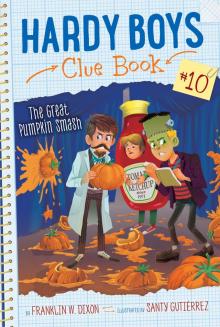 The Great Pumpkin Smash
The Great Pumpkin Smash Who Let the Frogs Out?
Who Let the Frogs Out?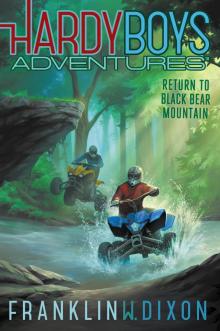 Return to Black Bear Mountain
Return to Black Bear Mountain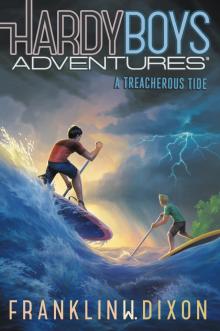 A Treacherous Tide
A Treacherous Tide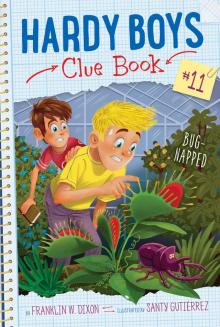 Bug-Napped
Bug-Napped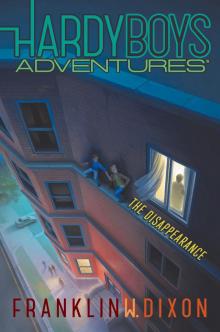 The Disappearance
The Disappearance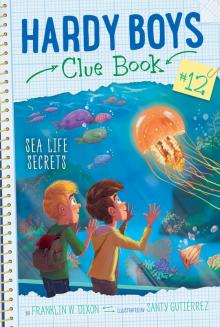 Sea Life Secrets
Sea Life Secrets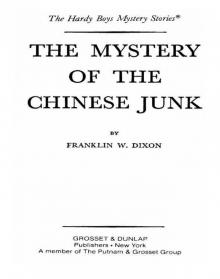 The Mystery of the Chinese Junk
The Mystery of the Chinese Junk A Skateboard Cat-astrophe
A Skateboard Cat-astrophe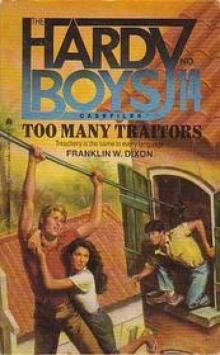 Too Many Traitors
Too Many Traitors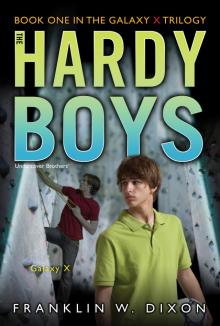 Galaxy X
Galaxy X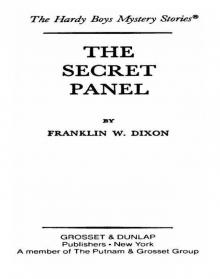 The Secret Panel
The Secret Panel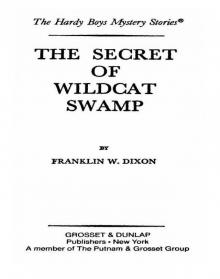 The Secret of Wildcat Swamp
The Secret of Wildcat Swamp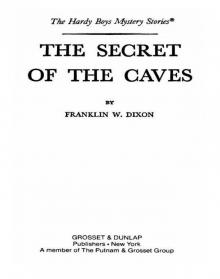 The Secret of the Caves
The Secret of the Caves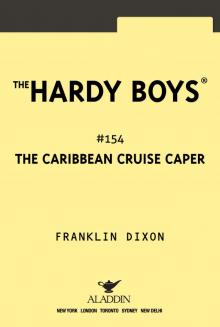 The Caribbean Cruise Caper
The Caribbean Cruise Caper Without a Trace
Without a Trace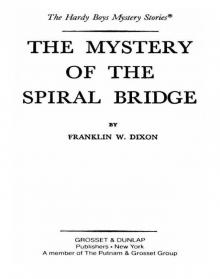 The Mystery of the Spiral Bridge
The Mystery of the Spiral Bridge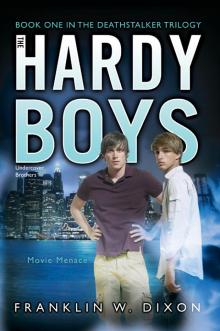 Movie Menace
Movie Menace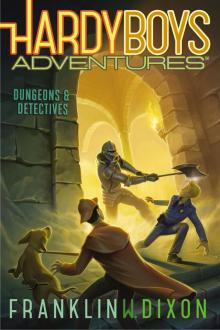 Dungeons & Detectives
Dungeons & Detectives Water-Ski Wipeout
Water-Ski Wipeout The Case of the Psychic's Vision
The Case of the Psychic's Vision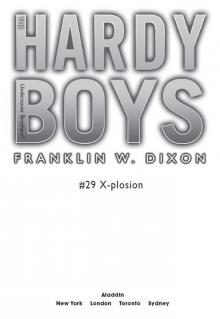 X-plosion
X-plosion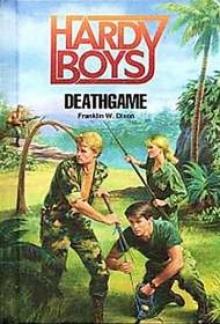 Deathgame
Deathgame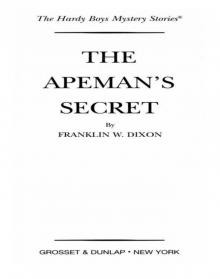 The Apeman's Secret
The Apeman's Secret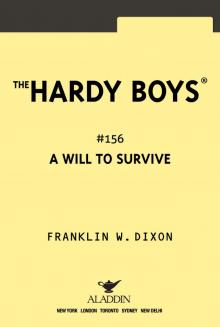 A Will to Survive
A Will to Survive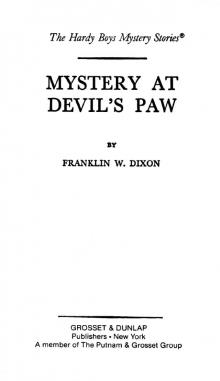 Mystery at Devil's Paw
Mystery at Devil's Paw Blood Money
Blood Money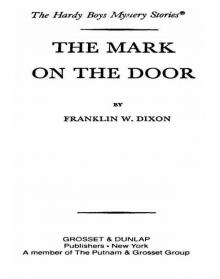 The Mark on the Door
The Mark on the Door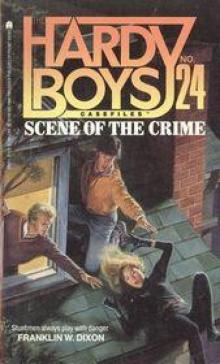 Scene of the Crime
Scene of the Crime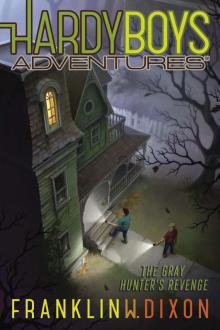 The Gray Hunter's Revenge
The Gray Hunter's Revenge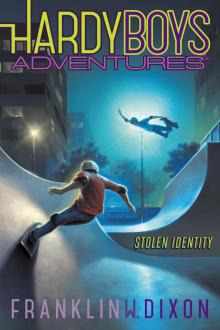 Stolen Identity
Stolen Identity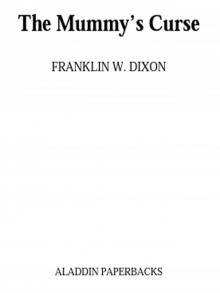 The Mummy's Curse
The Mummy's Curse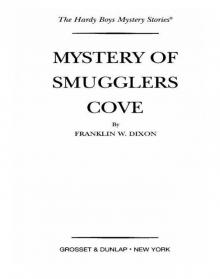 Mystery of Smugglers Cove
Mystery of Smugglers Cove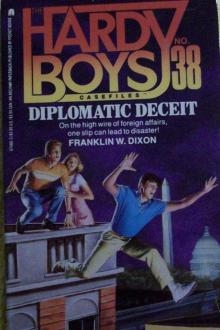 Diplomatic Deceit
Diplomatic Deceit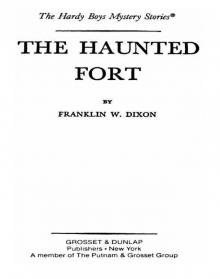 The Haunted Fort
The Haunted Fort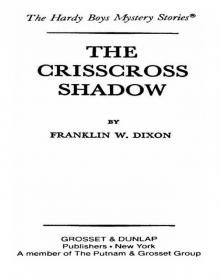 The Crisscross Shadow
The Crisscross Shadow Secret of the Red Arrow
Secret of the Red Arrow Trial and Terror
Trial and Terror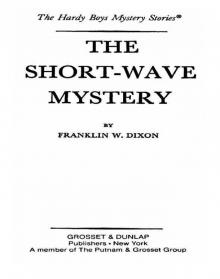 The Short-Wave Mystery
The Short-Wave Mystery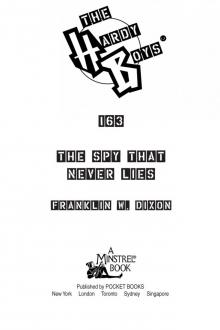 The Spy That Never Lies
The Spy That Never Lies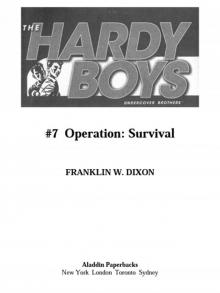 Operation: Survival
Operation: Survival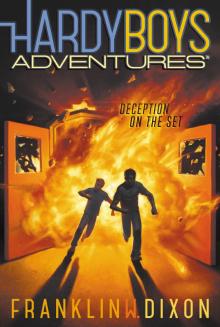 Deception on the Set
Deception on the Set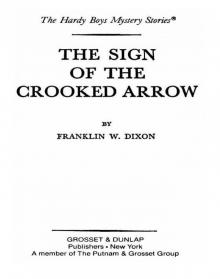 The Sign of the Crooked Arrow
The Sign of the Crooked Arrow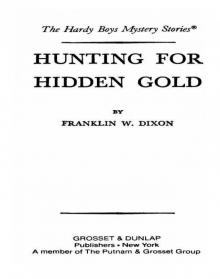 Hunting for Hidden Gold
Hunting for Hidden Gold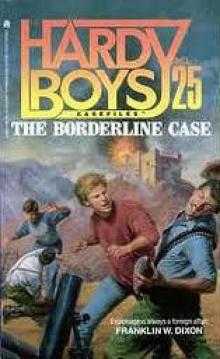 Disaster for Hire
Disaster for Hire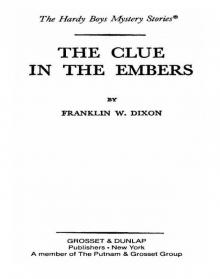 The Clue in the Embers
The Clue in the Embers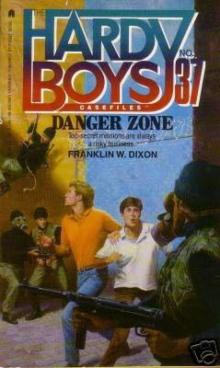 Danger Zone
Danger Zone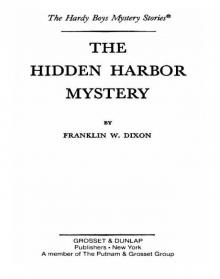 The Hidden Harbor Mystery
The Hidden Harbor Mystery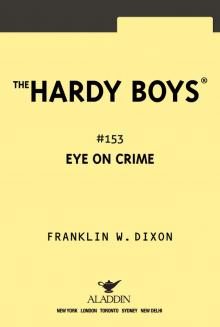 Eye on Crime
Eye on Crime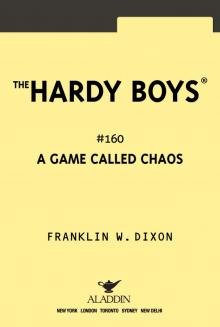 A Game Called Chaos
A Game Called Chaos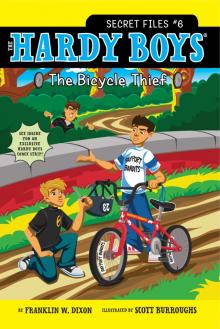 The Bicycle Thief
The Bicycle Thief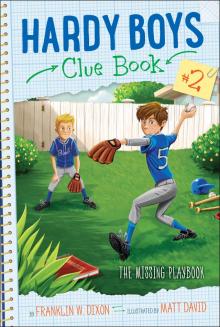 The Missing Playbook
The Missing Playbook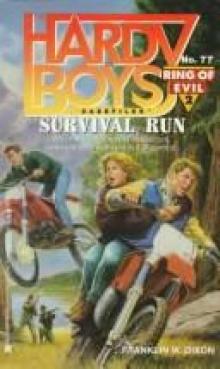 Survival Run
Survival Run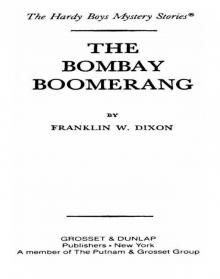 The Bombay Boomerang
The Bombay Boomerang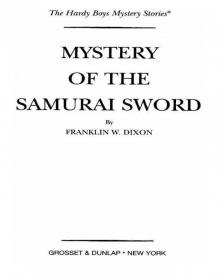 Mystery of the Samurai Sword
Mystery of the Samurai Sword Burned
Burned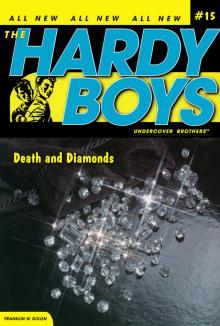 Death and Diamonds
Death and Diamonds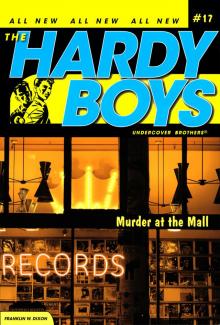 Murder at the Mall
Murder at the Mall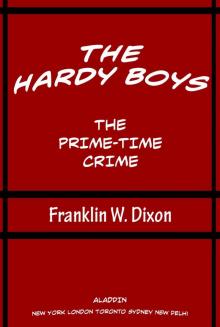 The Prime-Time Crime
The Prime-Time Crime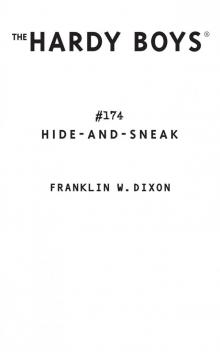 Hide-and-Sneak
Hide-and-Sneak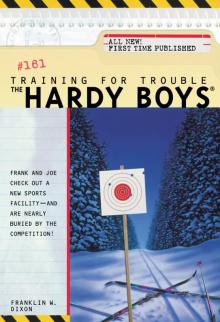 Training for Trouble
Training for Trouble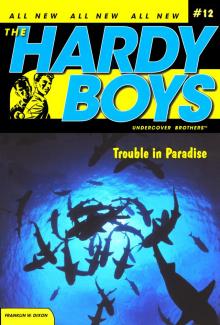 Trouble in Paradise
Trouble in Paradise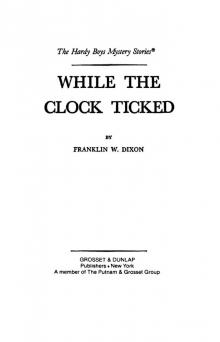 While the Clock Ticked
While the Clock Ticked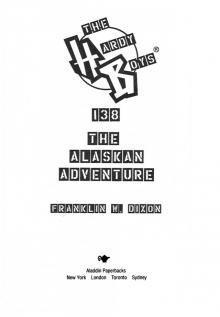 The Alaskan Adventure
The Alaskan Adventure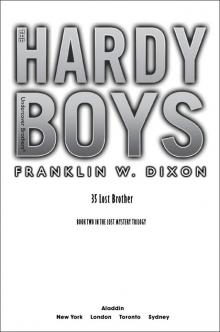 The Lost Brother
The Lost Brother Tunnel of Secrets
Tunnel of Secrets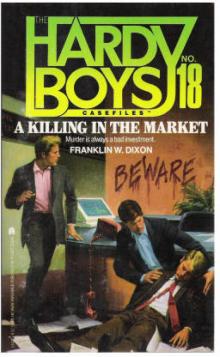 A Killing in the Market
A Killing in the Market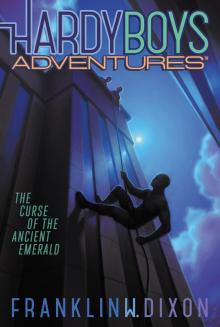 The Curse of the Ancient Emerald
The Curse of the Ancient Emerald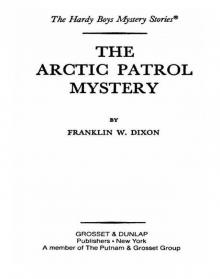 The Arctic Patrol Mystery
The Arctic Patrol Mystery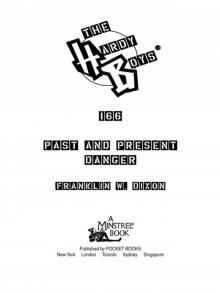 Past and Present Danger
Past and Present Danger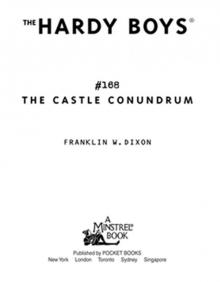 The Castle Conundrum (Hardy Boys)
The Castle Conundrum (Hardy Boys)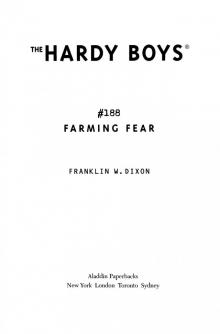 Farming Fear
Farming Fear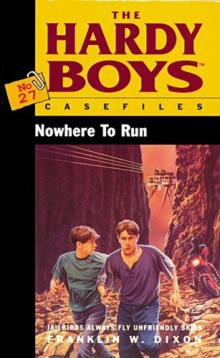 Nowhere to Run
Nowhere to Run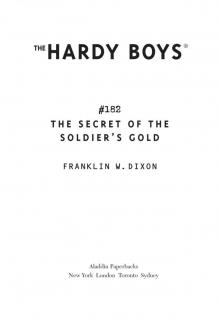 The Secret of the Soldier's Gold
The Secret of the Soldier's Gold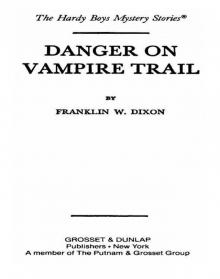 Danger on Vampire Trail
Danger on Vampire Trail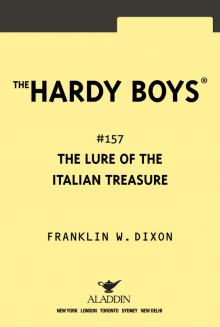 The Lure of the Italian Treasure
The Lure of the Italian Treasure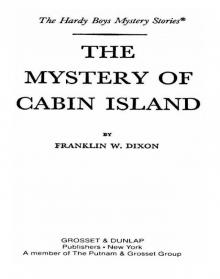 The Mystery of Cabin Island
The Mystery of Cabin Island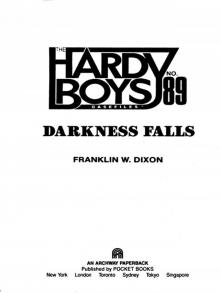 Darkness Falls
Darkness Falls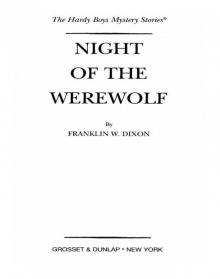 Night of the Werewolf
Night of the Werewolf Danger in the Extreme
Danger in the Extreme The Lazarus Plot
The Lazarus Plot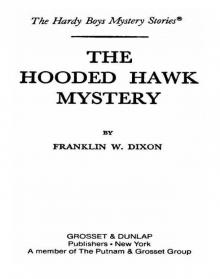 The Hooded Hawk Mystery
The Hooded Hawk Mystery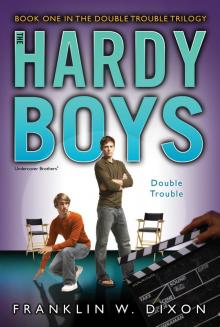 Double Trouble
Double Trouble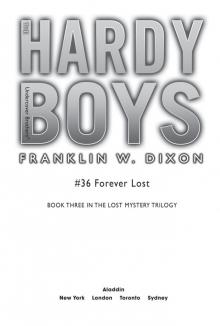 Forever Lost
Forever Lost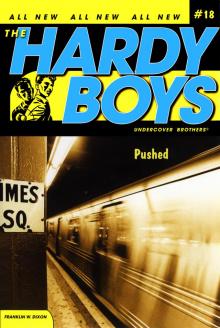 Pushed
Pushed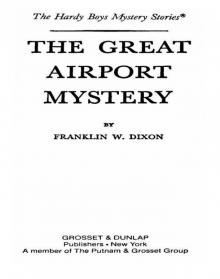 The Great Airport Mystery
The Great Airport Mystery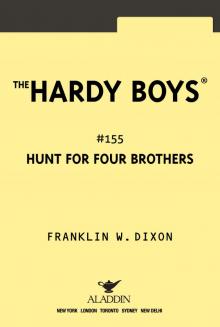 The Hunt for Four Brothers
The Hunt for Four Brothers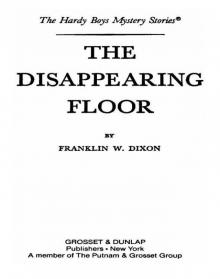 The Disappearing Floor
The Disappearing Floor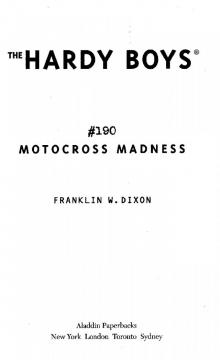 Motocross Madness
Motocross Madness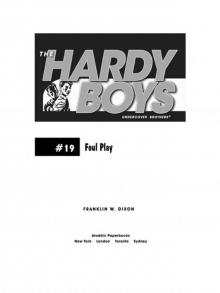 Foul Play
Foul Play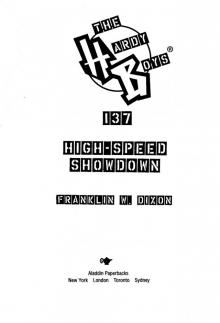 High-Speed Showdown
High-Speed Showdown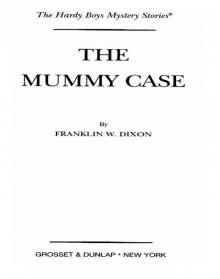 The Mummy Case
The Mummy Case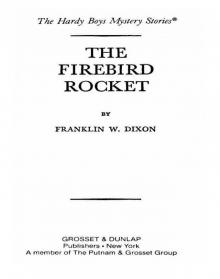 The Firebird Rocket
The Firebird Rocket Trouble in Warp Space
Trouble in Warp Space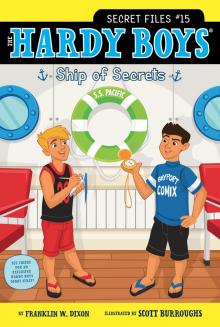 Ship of Secrets
Ship of Secrets Line of Fire
Line of Fire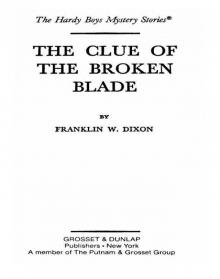 The Clue of the Broken Blade
The Clue of the Broken Blade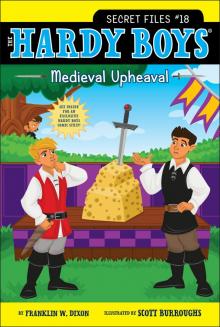 Medieval Upheaval
Medieval Upheaval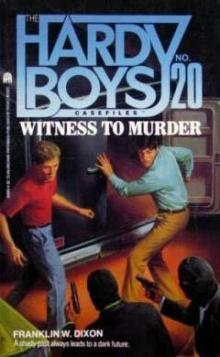 Witness to Murder
Witness to Murder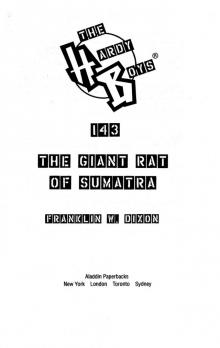 The Giant Rat of Sumatra
The Giant Rat of Sumatra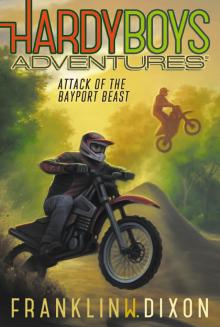 Attack of the Bayport Beast
Attack of the Bayport Beast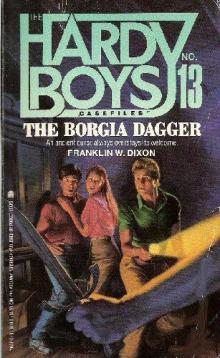 The Borgia Dagger
The Borgia Dagger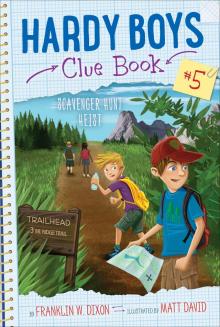 Scavenger Hunt Heist
Scavenger Hunt Heist No Way Out
No Way Out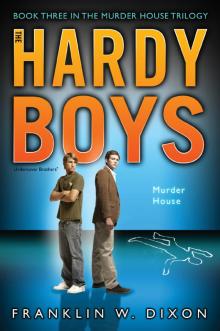 Murder House
Murder House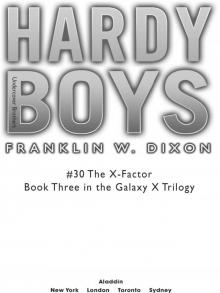 The X-Factor
The X-Factor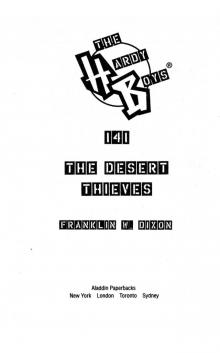 The Desert Thieves
The Desert Thieves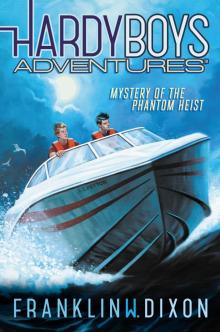 Mystery of the Phantom Heist
Mystery of the Phantom Heist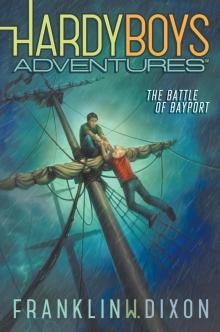 The Battle of Bayport
The Battle of Bayport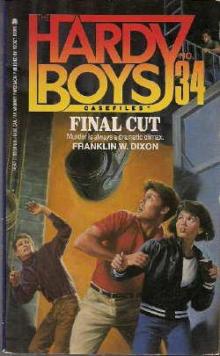 Final Cut
Final Cut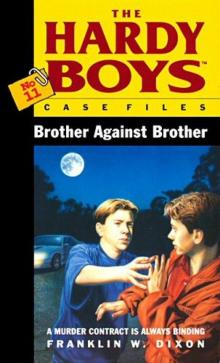 Brother Against Brother
Brother Against Brother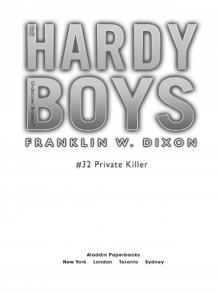 Private Killer
Private Killer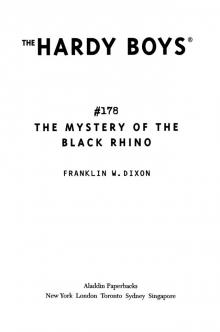 The Mystery of the Black Rhino
The Mystery of the Black Rhino Feeding Frenzy
Feeding Frenzy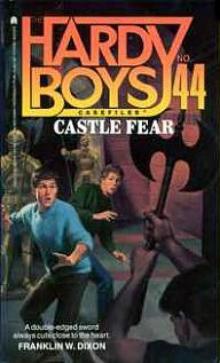 Castle Fear
Castle Fear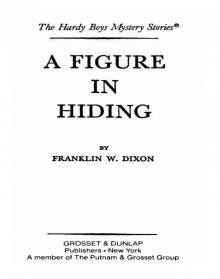 A Figure in Hiding
A Figure in Hiding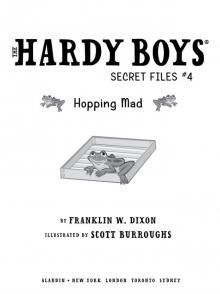 Hopping Mad
Hopping Mad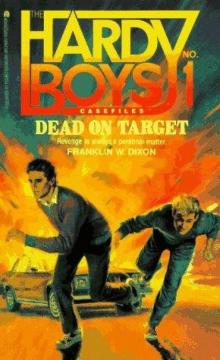 Dead on Target
Dead on Target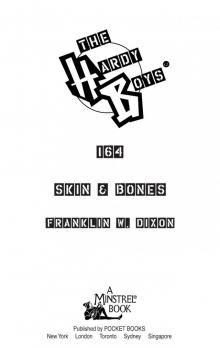 Skin and Bones
Skin and Bones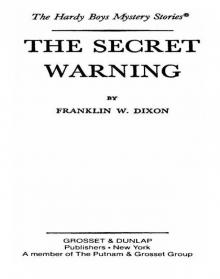 The Secret Warning
The Secret Warning Flesh and Blood
Flesh and Blood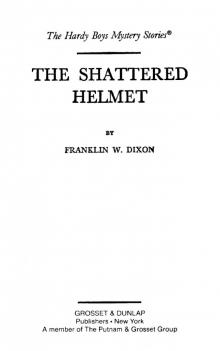 The Shattered Helmet
The Shattered Helmet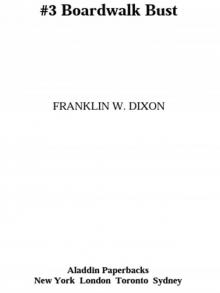 Boardwalk Bust
Boardwalk Bust Terror at High Tide
Terror at High Tide In Plane Sight
In Plane Sight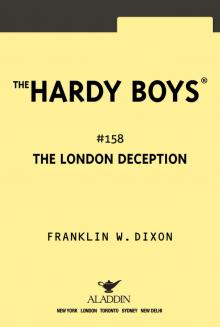 The London Deception
The London Deception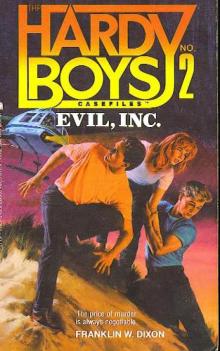 Evil, Inc.
Evil, Inc.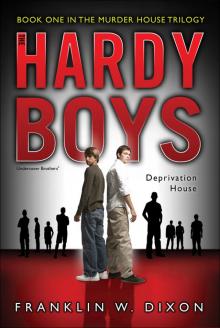 Deprivation House
Deprivation House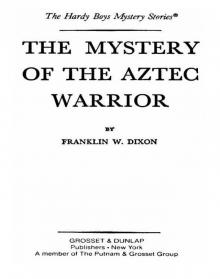 The Mystery of the Aztec Warrior
The Mystery of the Aztec Warrior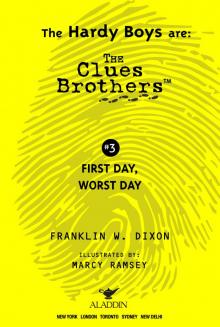 First Day, Worst Day
First Day, Worst Day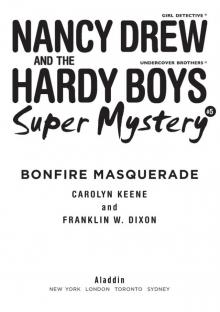 Bonfire Masquerade
Bonfire Masquerade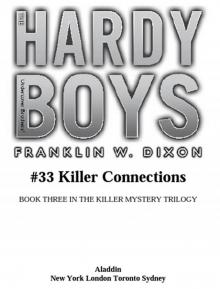 Killer Connections
Killer Connections Strategic Moves
Strategic Moves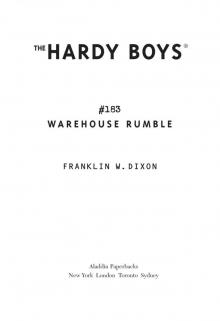 Warehouse Rumble
Warehouse Rumble The Chase for the Mystery Twister
The Chase for the Mystery Twister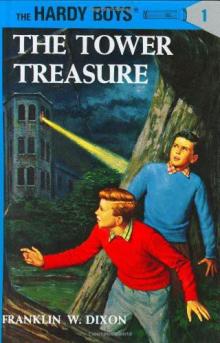 The Tower Treasure thb-1
The Tower Treasure thb-1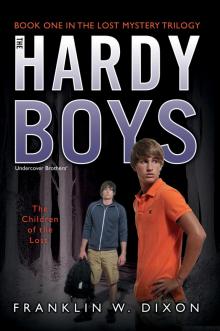 The Children of the Lost
The Children of the Lost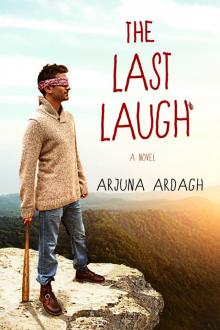 The Last Laugh
The Last Laugh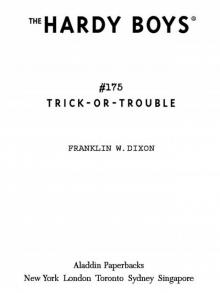 Trick-or-Trouble
Trick-or-Trouble Perfect Getaway
Perfect Getaway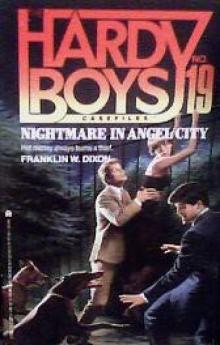 Nightmare in Angel City
Nightmare in Angel City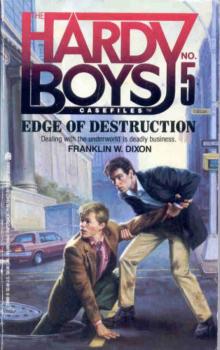 Edge of Destruction
Edge of Destruction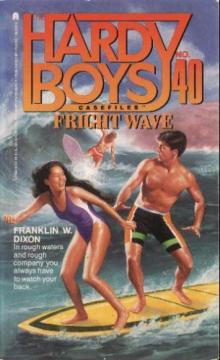 Fright Wave
Fright Wave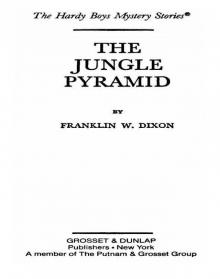 The Jungle Pyramid
The Jungle Pyramid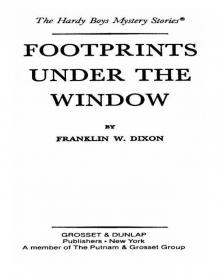 Footprints Under the Window
Footprints Under the Window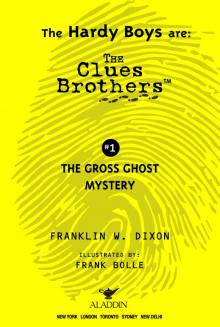 The Gross Ghost Mystery
The Gross Ghost Mystery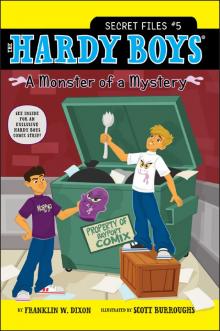 A Monster of a Mystery
A Monster of a Mystery House Arrest
House Arrest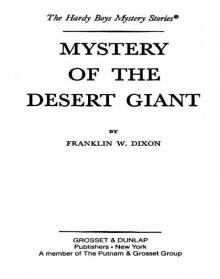 Mystery of the Desert Giant
Mystery of the Desert Giant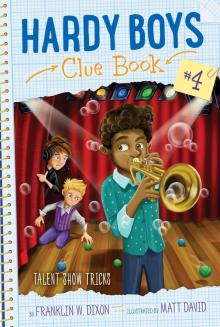 Talent Show Tricks
Talent Show Tricks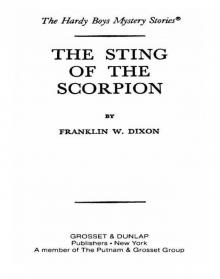 The Sting of the Scorpion
The Sting of the Scorpion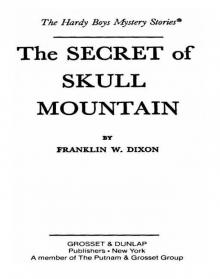 The Secret of Skull Mountain
The Secret of Skull Mountain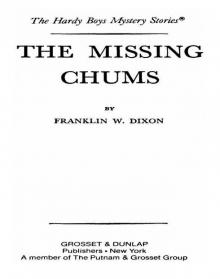 The Missing Chums
The Missing Chums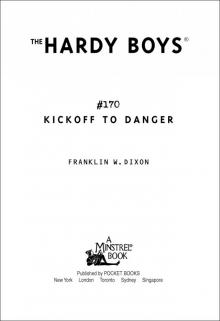 Kickoff to Danger
Kickoff to Danger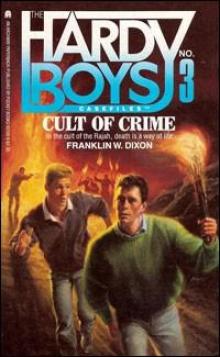 Cult of Crime
Cult of Crime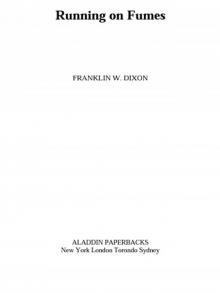 Running on Fumes
Running on Fumes Martial Law
Martial Law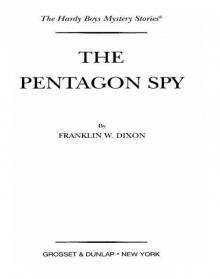 The Pentagon Spy
The Pentagon Spy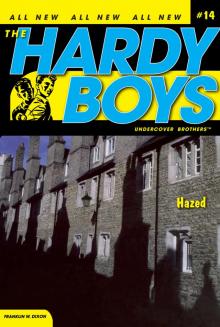 Hazed
Hazed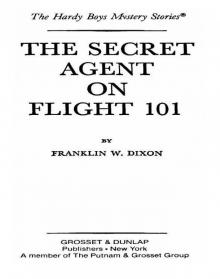 The Secret Agent on Flight 101
The Secret Agent on Flight 101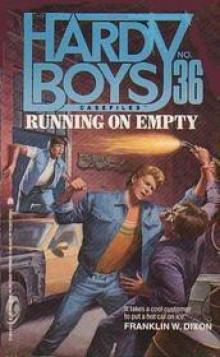 Running on Empty
Running on Empty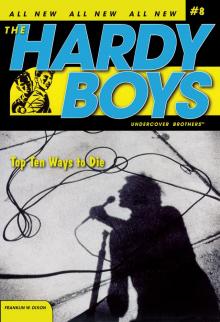 Top Ten Ways to Die
Top Ten Ways to Die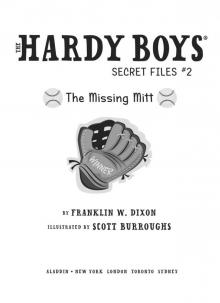 The Missing Mitt
The Missing Mitt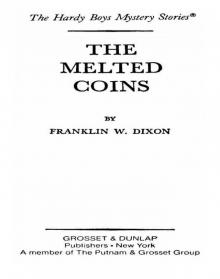 The Melted Coins
The Melted Coins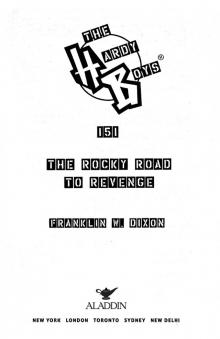 The Rocky Road to Revenge
The Rocky Road to Revenge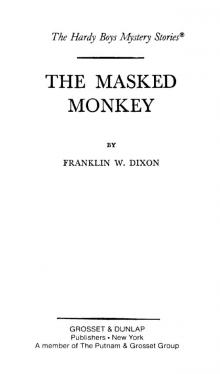 The Masked Monkey
The Masked Monkey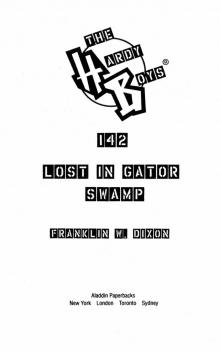 Lost in Gator Swamp
Lost in Gator Swamp Extreme Danger
Extreme Danger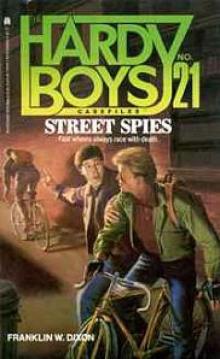 Street Spies
Street Spies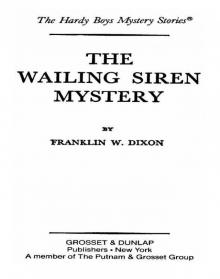 The Wailing Siren Mystery
The Wailing Siren Mystery The Dangerous Transmission
The Dangerous Transmission Hurricane Joe
Hurricane Joe The Crisscross Crime
The Crisscross Crime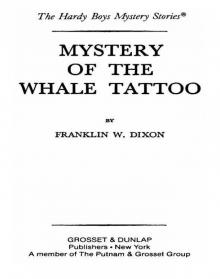 Mystery of the Whale Tattoo
Mystery of the Whale Tattoo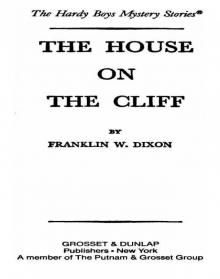 The House on the Cliff
The House on the Cliff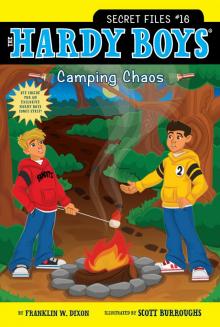 Camping Chaos
Camping Chaos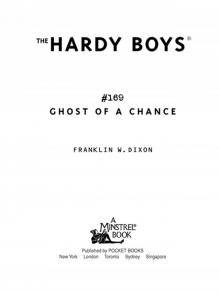 Ghost of a Chance
Ghost of a Chance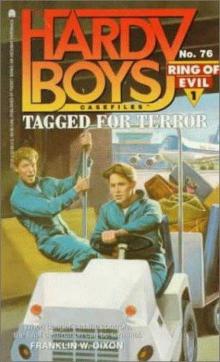 Tagged for Terror
Tagged for Terror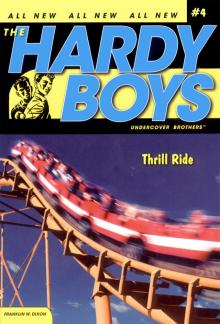 Thrill Ride
Thrill Ride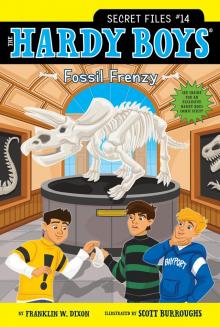 Fossil Frenzy
Fossil Frenzy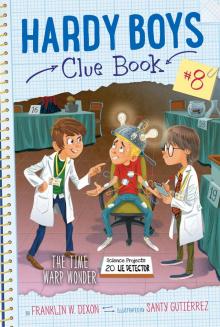 The Time Warp Wonder
The Time Warp Wonder Ghost Stories
Ghost Stories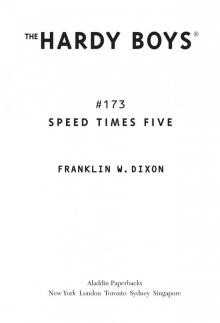 Speed Times Five
Speed Times Five What Happened at Midnight
What Happened at Midnight Three-Ring Terror
Three-Ring Terror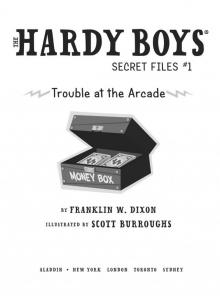 Trouble at the Arcade
Trouble at the Arcade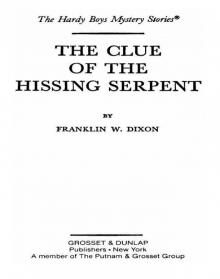 The Clue of the Hissing Serpent
The Clue of the Hissing Serpent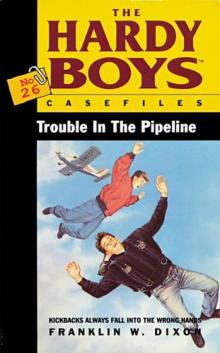 Trouble in the Pipeline
Trouble in the Pipeline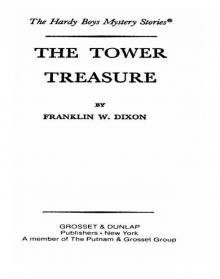 The Tower Treasure
The Tower Treasure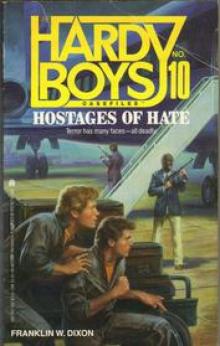 Hostages of Hate
Hostages of Hate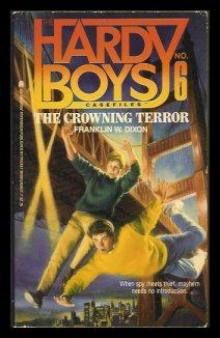 The Crowning Terror
The Crowning Terror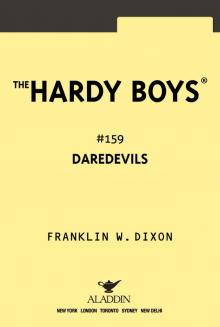 Daredevils
Daredevils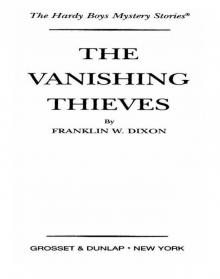 The Vanishing Thieves
The Vanishing Thieves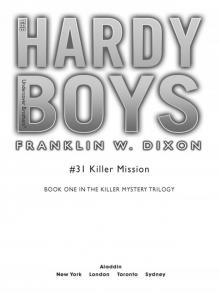 Killer Mission
Killer Mission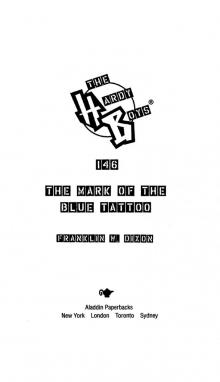 The Mark of the Blue Tattoo
The Mark of the Blue Tattoo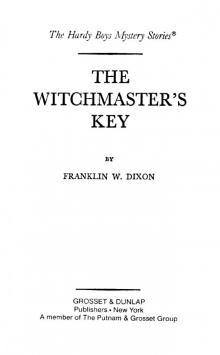 The Witchmaster's Key
The Witchmaster's Key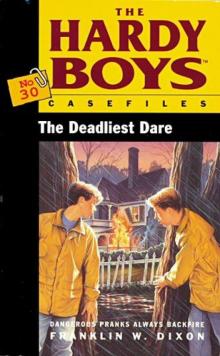 The Deadliest Dare
The Deadliest Dare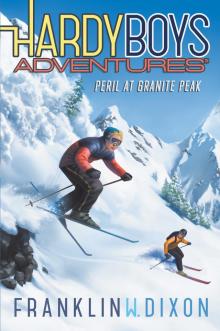 Peril at Granite Peak
Peril at Granite Peak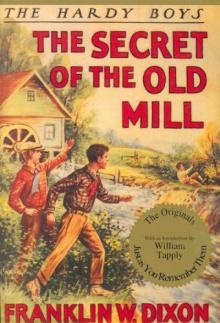 The Secret Of The Old Mill thb-3
The Secret Of The Old Mill thb-3 Rocky Road
Rocky Road The Demolition Mission
The Demolition Mission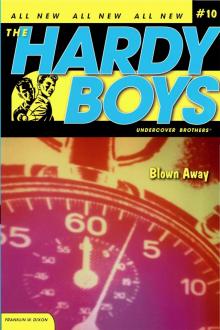 Blown Away
Blown Away Passport to Danger
Passport to Danger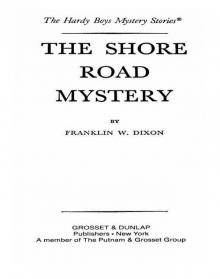 The Shore Road Mystery
The Shore Road Mystery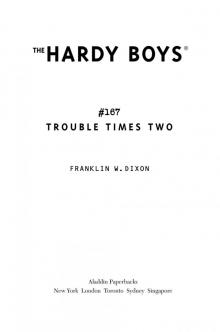 Trouble Times Two
Trouble Times Two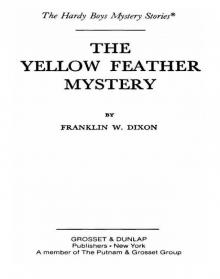 The Yellow Feather Mystery
The Yellow Feather Mystery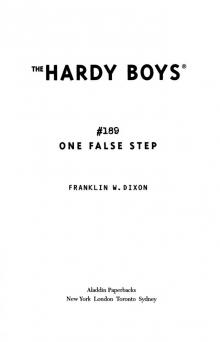 One False Step
One False Step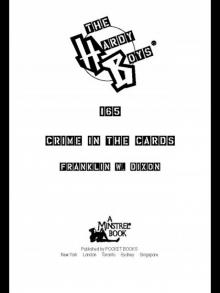 Crime in the Cards
Crime in the Cards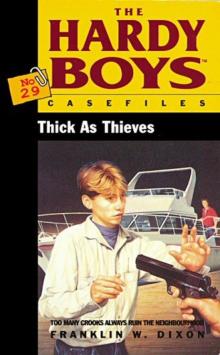 Thick as Thieves
Thick as Thieves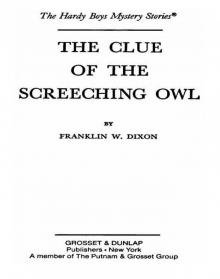 The Clue of the Screeching Owl
The Clue of the Screeching Owl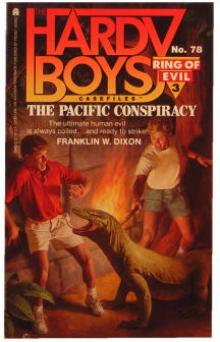 The Pacific Conspiracy
The Pacific Conspiracy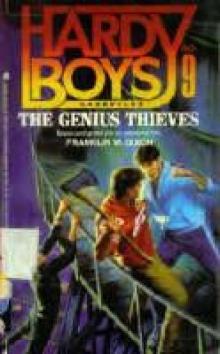 The Genius Thieves
The Genius Thieves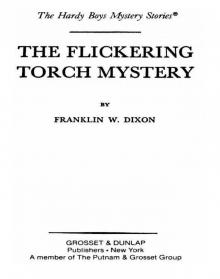 The Flickering Torch Mystery
The Flickering Torch Mystery Into Thin Air
Into Thin Air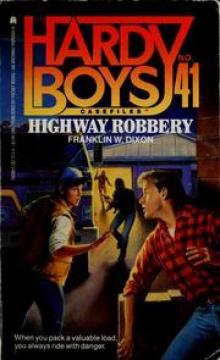 Highway Robbery
Highway Robbery Deadfall
Deadfall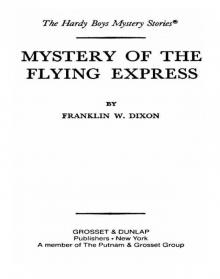 Mystery of the Flying Express
Mystery of the Flying Express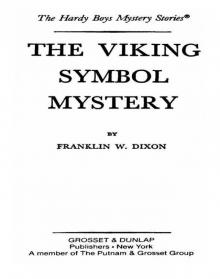 The Viking Symbol Mystery
The Viking Symbol Mystery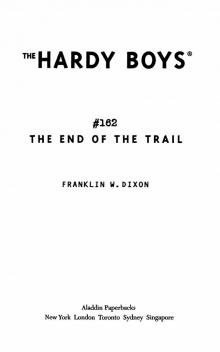 The End of the Trail
The End of the Trail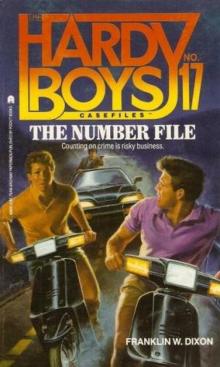 The Number File
The Number File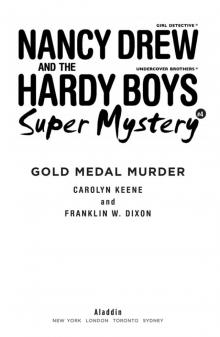 Gold Medal Murder
Gold Medal Murder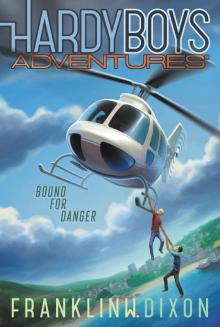 Bound for Danger
Bound for Danger Collision Course
Collision Course The Madman of Black Bear Mountain
The Madman of Black Bear Mountain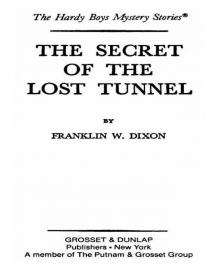 The Secret of the Lost Tunnel
The Secret of the Lost Tunnel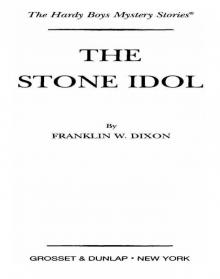 The Stone Idol
The Stone Idol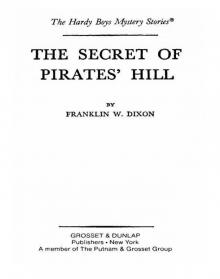 The Secret of Pirates' Hill
The Secret of Pirates' Hill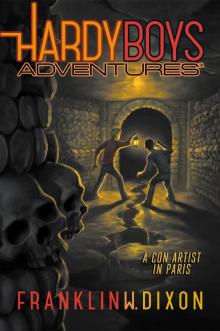 A Con Artist in Paris
A Con Artist in Paris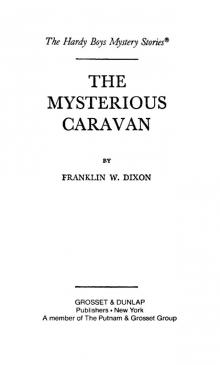 The Mysterious Caravan
The Mysterious Caravan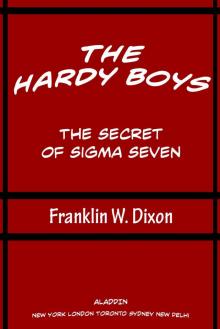 The Secret of Sigma Seven
The Secret of Sigma Seven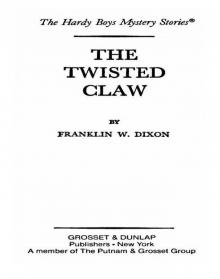 The Twisted Claw
The Twisted Claw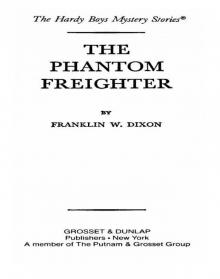 The Phantom Freighter
The Phantom Freighter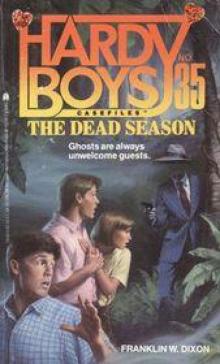 The Dead Season
The Dead Season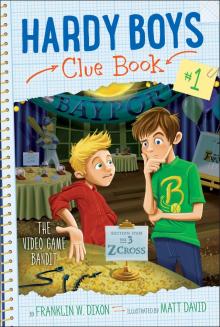 The Video Game Bandit
The Video Game Bandit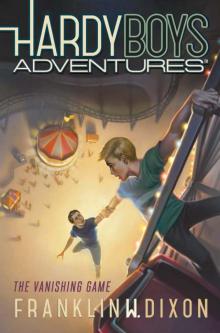 The Vanishing Game
The Vanishing Game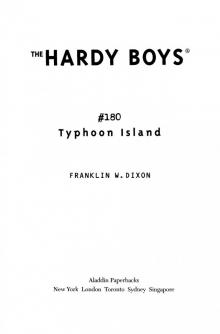 Typhoon Island
Typhoon Island